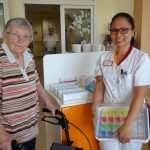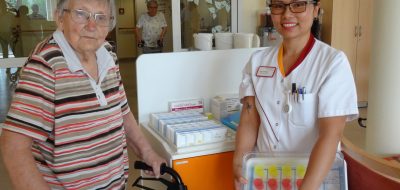Digital patient files, care via the monitor, electric assistants: the advancing digitalisation does not stop at care either. In the past ten years, manufacturers have developed more and more systems that benefit nursing. Read here how innovative care can benefit from digitalisation.
Electronic patient files
The documentation of medication intake and current blood pressure is a standard part of everyday nursing care in order to be able to track important health data and make adjustments in treatment if necessary. „Digitising this data simplifies daily work processes,“ knows Eike Jonker, managing director of two senior citizens‘ facilities, two nursing services and two day care centres under the German operator Vechtetal. Nursing staff can quickly and easily record blood pressure values and confirm the intake of medication. The responsible doctors have access to the documents at any time after approval. Another advantage: illegible handwriting is no longer a problem with digital patient records and thanks to online storage, no important data is lost.
Nursing beds with resident monitoring
„How soundly residents sleep and how much they move in their sleep are important data for us,“ says Jonker. Because the sleep profile says a lot about the general state of health. He relies on digital assistance systems, such as SafeSense® 3. At first glance, the care assistant seems to be nothing more than a thin bed pad. But there is so much more behind it. SafeSense® 3 – consisting of a sensor mat and a signal line – provides caregivers with automatically processed health data.
In this way, the nursing beds with resident monitoring optimise information and time management in care. And thus relieve the nursing staff. „A relief for our staff. Especially for night duty, where often only a few staff are assigned,“ says the managing director of Vechtetal. On tablet and co., caregivers can see when seniors are in or out of bed. Through a sensor mat under the mattress, the system also notices changes in pressure. The smart tools thus not only serve to detect falls at an early stage. At the same time, they provide an alarm system for repositioning and thus prevent pressure sores. „We can also recognise an incorrect medication setting from an unsettled sleep profile,“ says Jonker.
Telecare
Since the pandemic at the latest, it has become clear that many things can be done via online tools that were previously only conceivable in person. This is also the case in care. „With telecare, it is possible to exchange data by sensor between care providers and people in need of care who live in their own homes,“ writes the German AOK Federal Association online. Blood sugar, blood pressure and pulse of the senior citizens are forwarded online to the care providers. They can then intervene in presence in extreme cases. „Affected persons can also be equipped with sensors that trigger an alarm if they fall or do not move for a long time,“ says the AOK on its website. Away from the possible extreme situations, caregivers support seniors remotely via video call. They ask about the current health status, discuss medication intake, answer relevant questions and are a positive change from the often lonely everyday life of those in need of care in their own homes.
Care robotics
More and more people in need of care, less and less staff. This is the frightening reality and future perspective of care, which the German professional association for care professions calls „care collapse“. So the idea of using robots in care does not seem far away. „But the fact is that there is no robot that really cares and replaces the interpersonal,“ Jonker is certain. In terms of motor skills, electric caregivers cannot come close to humans: due to their castors, robots can only move in barrier-free areas and cannot climb stairs. Even in the lift, they often need support from humans. The same applies to self-evident care activities such as dressing and undressing.
Where the electronic helpers can provide support, however, is in the entertainment and basic care of senior citizens. Robot Pepper from the company BoS&S supports seniors individually with movement and memory games and reminds them to take their medication. The aim is to free up more time for caregivers by taking over social care. The never-tiring electric caregivers can also make things easier for people physically. For example, the transport robots at the Immanuel Clinic in Rüdersdorf. They deliver food to the patient’s room, bring fresh laundry to various wards and can transport goods weighing up to 500 kilograms. „Care for the elderly will remain a human service. Only the processes around it are becoming more and more digitalised,“ sums up the Vechtetal Managing Director.


